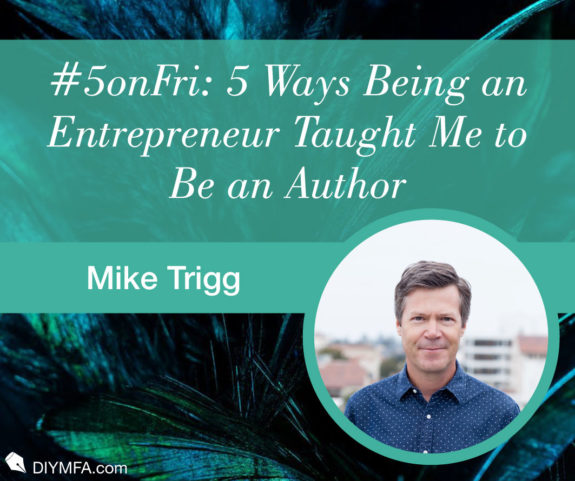It was six months into the COVID pandemic that I made one of the biggest career decisions of my life. I had spent over 20 years in the tech industry, mostly as a founder, or early employee, at Silicon Valley tech startups. I had just decided to shut down my latest venture and was feeling burned out.
So I decided to make the most of that setback by pursuing something radically different that I had always wanted to do: write a novel.
Two years later, my debut novel, Bit Flip, is finally being published. It has been a long journey that felt daunting at first. But what I discovered along the way is that my time as a tech entrepreneur actually prepared me quite well for being a novelist.
Although it felt like a 180-degree pivot at the time, I’ve come to recognize the striking similarities of the two occupations. Both are, essentially, typing words (or code) into a computer to create a product. Both are forms of entertainment. And both have discouragingly low probabilities of success.
Beyond those vocational similarities, I realized there were many lessons I learned as an entrepreneur that, somewhat unexpectedly, prepared me to be an author. I offer these learnings here because I believe they represent a unique perspective and perhaps different advice than most authors receive.
Authors are taught to focus on their craft, that great writing will get discovered. Most don’t think of embarking on a career as an author like starting a business, but, in many ways, that’s exactly what it is. In short, they approach their writing careers like MFAs, not MBAs.
With that preamble, here are the 5 things I learned and practiced as an entrepreneur that directly translated to becoming an author. Hopefully, this will provide aspiring authors with an alternative mental framework for pursuing a career in writing—and maybe even encourage some entrepreneurs that becoming an author isn’t so farfetched.
1. Creating Something from Nothing
The core similarity between starting a company and writing a book is that, at the outset, they are only an idea in your head. Transforming that idea into something real requires tremendous vision, creativity, and tenacity. When founding a company, you have to have a thesis not only for what your product will be, but why customers will want to buy it and how it will be differentiated in the market.
Writing a book requires the same level of passion, determination, and unwavering belief that you can bring your idea for a story to life in a unique and compelling way. Some writers plan out their story like a product manager writing a product requirements document, some writers just start writing like a coder who can visualize an entire software program in his head.
Personally, my approach falls between these “Planner” and “Pantser” approaches—creating an outline that I frequently stray from along the way—but this part of the creative process is my favorite. Coming up with ideas for new products was what I loved about being an entrepreneur. And it’s probably my favorite part of being an author as well.
Finding inspiration, refining your concept, and delivering that first, raw instantiation of your idea is like a drug, whether it’s starting a company or writing a novel.
2. Obsessing Over Product
One of the most important practices I learned building software products is the ability to continuously refine your offering.
It starts with a really rough version of your product (a “minimum viable product” in start-up lingo), which you expose to friends and family—your “alpha” users. Then you capture and incorporate their feedback into a next version of your product.
As you broaden to a larger set of “beta” users, you analyze their usage, conduct user surveys, organize focus groups, run A/B tests, and capture feedback any way possible, which again gets incorporated into a next version, and a next, always improving.
The same technique applies to writing a book. Many authors think of writing as a solitary exercise—words in your head captured on the page. But once your story is written, and ideally along the way, you need feedback from customers.
Solicit as many early readers as you can. Be explicit about the type of feedback you want from them. Join writing classes and workshop your story with your peers. Hire professional editors to critique your work.
Don’t be bashful. Candid criticism is invaluable. Listen to and incorporate their feedback. Obsess over getting it right. Let the market steer you toward a successful book, just as market research can steer an entrepreneur to a successful product.
3. Investing in Yourself
Another critical lesson I took from entrepreneurship and applied to becoming an author is the willingness to invest in yourself.
You need to have faith that the near-term income you are forgoing will be worth it, despite the long odds of success. When starting a company, you usually need to bootstrap it at the beginning, investing your own time and money to get the venture off the ground before raising capital from outside investors.
Becoming an author requires a similar investment of time and money into the success of your books. Just as if you were starting a business, you need to know what you are willing and able to invest. How much income do you need? How much progress can you make writing on nights and weekends? Can you afford to write full-time? What other sources of income can you develop? Do you have a spouse or partner who can support you while you write?
Be scrappy and efficient. Give yourself a budget and timeframe. Approach it in a financially sustainable way. Getting into financial distress will only set you back. Just like the entrepreneur who has built a meaningful equity stake for herself in her own business, the rewards—not only financial but emotional—for an author can be substantial.
4. Building a Brand
As an entrepreneur, I spent as much time strategizing over sales and marketing as I did product. In business parlance, I focused on building a brand—from the corporate logo, to messaging and positioning, to user experience, to the “brand promise” communicated to customers.
As I pivoted to writing, I learned that, just like building a brand for a company, you need to build an author brand. This discipline is one where I see many authors struggle. They view the “promotional” aspects of writing as a distraction or the job of their publisher. They underinvest in building a website, developing a social media presence, producing engaging content, publicizing their work, and the myriad other efforts required to build a brand.
Even those who do invest in these tactics often lack a larger strategy. They aren’t thoughtful about what they want their author brand to represent.
The best-selling authors all have clear brands. Their readers know what to expect, from the subject of their writing to the fonts on their covers, and that turns them into fans.
If you’re not a best-selling author, then you need to build your author brand yourself. You need to look as professional and established as possible. You need to be conscious and consistent about what your author brand will be.
Plot out the reader journey, from initial discovery, to social proof, to first-time reader, to 5-star reviewer, to loyal fan. This requires not just your book itself, but all the messages, reviews, media coverage, and other ancillary content that constitute a full-fledged brand.
5. Creating an Ecosystem
Perhaps the biggest lesson I learned as an entrepreneur that applies equally to writing is you can’t do it alone. Every entrepreneur needs to be scrappy at the beginning, usually mustering an initial product by themselves or with a small set of co-founders. But to scale that business up requires an ecosystem—investors, employees, partners, and others to grow it into a real business.
Many first-time writers fall into the trap of trying to do everything themselves. While they recognize the need for an agent or publisher, they fail to develop the other complementary talent necessary for success. Becoming a successful author requires an ecosystem.
Even if you are self-publishing, you need a developmental editor, copyeditor, proofreader, designer, cover artist, publicist, and other critical functions.
Nobody possesses all the disparate skill sets necessary to launch a successful book. Even if you somehow did, the time required to perform all those functions yourself would mean you never publish. Just look at the acknowledgements page of any book—it’s a long list of people!
Be thoughtful about all the additional resources and investments you need to make. Ask other authors. Get references and recommendations. Post projects on Reedsy. However you do it, having a team around you will result in a much better book and a much higher probability of success.
The process of becoming a published author has been incredibly rewarding. At the same time, it’s been unexpectedly familiar from my time as a tech entrepreneur. The thrill of people reading my book is nearly identical to the excitement of having those first customers use a product I helped build.
I’ve come to see becoming a novelist less as the radical career change I first thought, and more as the latest chapter in my lifelong interest in entrepreneurship. A continuation of what I loved about founding tech companies, activating the same passion, creativity, and determination.
I hope these learnings help you approach your career as an author more like an entrepreneur.

Mike Trigg is an author and former tech executive. His debut novel, BIT FLIP, comes out August 16 with SparkPress. Follow Mike on Facebook, Twitter, and Goodreads, or on miketrigg.com.







